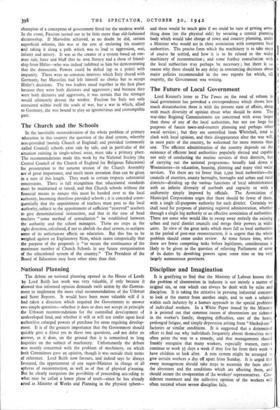The Church and the Schools
In the inevitable reconsideration of the whole problem of primary education in this country the question of the dual system, whereby non-provided (mainly Church of England) and provided (commonly called Council) schools exist side by side, and in particular of the situation existing in single-school areas, must take a primary place. The recommendations made this week by the National Society (the Central Council of the Church of England for Religious Education) for presentation to the autumn session of the Church Assembly are of great importance, and merit more attention than can be given in a note of this length. They mark in certain respects substantial concessions. There is full recognition that educational standards must be maintained or raised, and that Church schools without the financial means to ensure this must be handed over to the local authority, becoming therefore provided schools ; it is conceded conse- quentially that the appointment of teachers must pass to the local authority, subject to the appointment of sufficient "reserved" teachers to give denominational instruction, and that in the case of head teachers "some method of consultation" be established between the authority and the school managers. These are steps in the right direction, calculated, if not to abolish the dual system, to mitigate some of its unfortunate effects on education. But this has to be weighed against an Explanatory Note, which states categorically that the purpose of the proposals is "to secure the continuance of the maximum number of Church Schools in any future reorganisation of the educational system of the country." The President of the Board of Education may have other aims than that.


























 Previous page
Previous page